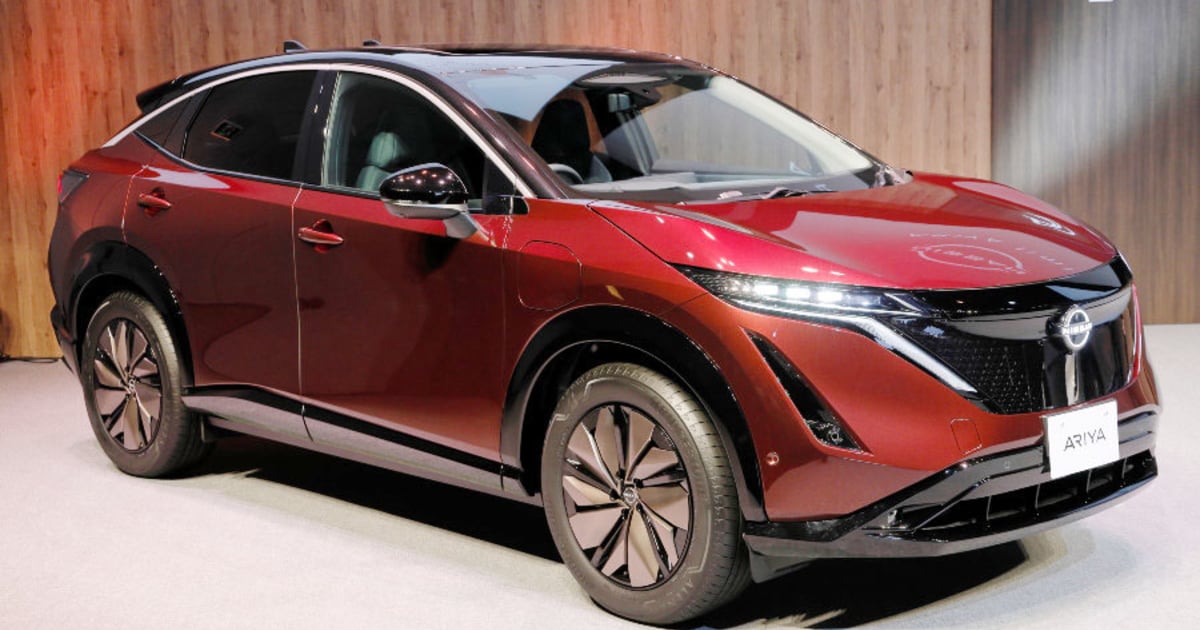
Nissan Motor Co., citing high battery material costs, warned dealers on Sunday that U.S. supplies of the Ariya crossover, a flagship electric vehicle, will be limited this year.
The Japanese automaker, during a make meeting at NADA, also announced plans for a wave of new EV and gasoline models it hopes will boost U.S. market share to more than 6 percent in fiscal 2023 from 5 percent last year. Nissan expects a 19 percent increase in production in 2023 vs. 2022.
The Ariya was slated to launch in mid-2021, but COVID-related chip shortages delayed it. U.S. deliveries began late last year.
The new halo model is critical to Nissan’s effort to reclaim its position in a segment it pioneered with the launch of the electric Leaf hatchback more than a decade ago.
Availability and affordability of the Ariya were on dealers’ minds at the meeting Sunday, with many of the roughly 200 retailers in attendance wanting to know why they aren’t receiving more units.
“Every dealer was saying how many customers they have waiting or wanting to order one,” Nissan Dealer Advisory Board Chairman Tyler Slade told Automotive News.
Nissan declined to disclose U.S. allocations of the Ariya. But a person briefed on the matter said about 6,000 units were allocated for fiscal 2022, which ends March 31, 2023. About 4,500 of those are built.
Nissan will ramp up Ariya production later this year, with U.S. allocations expected to rise to about 30,000 units for fiscal 2023.
Slade, operating partner at Tim Dahle Nissan Southtowne in suburban Salt Lake City, said his store received interest from about 100 potential customers, some of whom have put down a deposit.
One dealer at the meeting said he was “shocked and deflated” at the lack of supply of the halo model.
“Why can’t we produce the Ariya in any acceptable volume?” the dealer said, requesting he not be identified.
“Customers are walking in saying, ‘I’m sold, let me buy one,'” the dealer said. “But we can’t tell them when it’s coming.”
Slade said scarcity is okay.
“We like to have more demand and supply because it holds transaction prices,” he said. “For the average dealer, this is good as long as we have some throughput.”
Nissan executives responded to dealers with a plea for patience.
“We want it as bad as you. We’re full steam ahead,” was the message from the factory, Slade said.
Judy Wheeler, Nissan division’s U.S. vice president of sales and regional operations, acknowledged that the cost and availability of battery components would make Ariya output a challenge in 2023.
The price of some of those commodities has “tripled and quadrupled,” Wheeler told Automotive News. “That’ll be the part that I think will make it difficult for all U.S. manufacturers.”
U.S. sales of the Ariya tallied 201 in the fourth quarter.
The Ariya’s slow rollout underscores the whiplash underway as automakers balance surging EV raw material costs with affordability, while protecting profit margins, as some rivals, led by Tesla Inc., cut EV prices.
“Shorter delivery times, price cuts, and falling used values mark a new ‘reset’ chapter for EVs, creating a need to rebalance the auto portfolio,” Morgan Stanley analyst Adam Jonas said in a report last week.
Wheeler assured dealers that securing Ariya supply for the U.S. is a “top priority.”
“The U.S. is a strategic and important market for Nissan,” she said.
Dealers sought more lease support and asked if the Ariya would qualify for the up to $7,500 in commercial clean vehicle tax credits.
Wheeler said Nissan’s initial focus is on meeting early demand from the Ariya, which she described as “excellent.”
“We are just in the launch phase of this vehicle,” Wheeler said. “As inventory increases, we will reevaluate our position [based on] where we’re at in the marketplace and the dynamic.”
Nissan officials also used the meeting to broadly preview a new business plan, dubbed Beyond Next, to be revealed to U.S. retailers this summer. Nissan, at that time, will also share new market share and profitability targets, marketing initiatives, and customer care initiatives, Slade said.
Beyond Next is an evolution of the current Nissan Next plan and will showcase Nissan’s future product road map.
In the U.S., Nissan expects EVs to account for 40 percent of sales by 2030. Several new battery-powered models are expected, including a lightweight electric pickup.
But unlike some automakers, Nissan sees opportunities in gas-powered vehicles.
“Nissan will see a little more open swim lanes in ICE because everybody else is going EV,” Slade said.
Nissan’s current focus on profit over market share will stay the same with the Beyond Next plan. At the meeting, brand execs reinforced their commitment to maintaining a 45-day supply.
Said Slade: “Although some models will go beyond that, Nissan is committed to fixing that.”